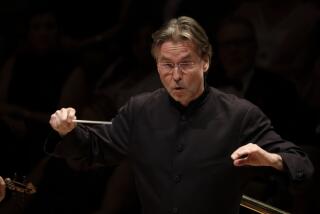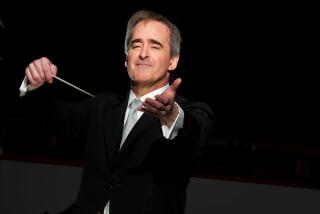Critic’s Notebook: L.A. Phil alum Lionel Bringuier wows in Zurich
Swiss audiences aren’t known to stand, not, anyway, during ovations at orchestra concerts. Maybe that comes with the complacent territory. Lucky Switzerland ranks No. 1 on the where-to-be-born index.
Or maybe — however exceptional the quality of life, however stuffed with money are Zurich’s banks, however high the life expectancy at birth and however fast the average Internet speed — the crowd just needs a little encouragement from the right outsiders.
Last week, Lionel Bringuier, the 27-year-old former assistant and resident conductor of the Los Angeles Philharmonic, began his first season as music director of the venerable Zurich Tonhalle Orchestra. And cheering him on were L.A. Phil Music Director Gustavo Dudamel, L.A. Phil conductor laureate Esa-Pekka Salonen and Walt Disney Concert Hall architect (and L.A. Phil board member) Frank Gehry.
The program ended with Bringuier’s electrifying, all but gravity-defying performance of Berlioz’s psychedelic “Symphonie Fantastique.”
Like galvanizing yoga instructors able to stir the stiffest bodies, Dudamel, Salonen and Gehry rose to their feet enthusiastically applauding. And following their lead were 1,400 sober bankers, politicians, socialites and classical music lovers standing and cheering too, as if the ground beneath everyone’s feet had suddenly shifted.
“I’m so proud,” Dudamel — who, like Salonen, was a mentor to Bringuier at the L.A. Phil — said in an emotional toast after the concert. “You cannot imagine how proud I am. It’s like my brother was just in the Olympic Games or the World Cup.
“Go, Lionello,” Dudamel cheered, using his nickname for the slender, boyish, clean-cut, irrepressibly cheerful young conductor.
Bringuier clearly brings a new spirit to Zurich. It is a city that, for all its conservatism, doesn’t mind a party and that has had a history, perhaps inadvertently, of shaking things up.
Dada had its start here in 1916, the result of German, Romanian and French émigré artists looking for a politically neutral island of sanity in a world at senseless war. It was in Zurich where James Joyce finished “Finnegans Wake” in 1939, where he died two years later and is buried.
But orchestral change doesn’t come quite so easily. For Switzerland’s largest celebration, the country’s 700th anniversary in 1991, the annual Zurich Festival was devoted to Joyce and John Cage, the American composer having a strong connection with the works of the Irish writer. The city’s music establishments rebelled. During a performance of Cage’s “Europeras 1 and 2,” the Zurich Opera orchestra displayed unprofessional foolishness.
“The music of the future,” Cage wrote in a letter to the orchestra, “is not one with which we are familiar,” telling the players that human nature is not as bad as we are often told. “People,” he encouraged, “can actually change their minds.”
Rising star
Bringuier’s appointment to the Tonhalle, 23 years later, is Zurich’s most energetic commitment since to major musical change of mind and one likely to resonate throughout Europe. Founded in 1868 and for much of its nearly 150 years a bastion of conventionality, the Tonhalle Orchestra has boldly put its trust in the youngest conductor in recent years to take over a major European orchestra. On top of that, this rising French star happened to have come of age in the nurturing, visionary environment of the L.A. Phil.
Born in 1986 in Nice and trained as a cellist and conductor at the Paris Conservatory, Bringuier attracted the attention of the late L.A. Phil Executive Director Ernest Fleischmann at the 2005 Besancon International Competition for Young Conductors in France. Bringuier was 19. The next year, Bringuier auditioned with “Symphonie Fantastique” and was selected over a large number of older candidates to become Salonen’s assistant with the L.A. Phil. Bringuier rose to associate conductor when Dudamel took over the orchestra in 2009 and then to resident conductor, leaving last year.
Along the way, Bringuier stepped in for Dudamel to conduct Tchaikovsky’s “Pathetique” for the first time with no warning and no rehearsal, Dudamel having sprained his neck in the first half of the concert. Bringuier had just enough time to race to his downtown apartment and change during intermission, yet he brought something spry and new to the symphony. That was Bringuier on the podium three years ago, when pianist Yuja Wang made her high-profile Hollywood Bowl debut in a dress soon to be seen around the world.
And so there they all were last week. Bringuier invited Salonen to be Zurich Tonhalle’s creative chair, and he daringly opened his first concert as music director with the premiere of Salonen’s “Karawane.” A riotous, exuberant 30-minute work for chorus and orchestra, it channels the spirit of Dadaism, with a nonsense text by one of the movement’s founders, Hugo Ball. Several other Salonen pieces are scheduled this season, and he will guest conduct the orchestra.
Wang too has a role; Bringuier has made her this season’s artist-in-residence. She played Prokofiev’s Second Piano Concert with him on his opening program, and she will accompany Bringuier on his first European tour with the Tonhalle. At the next Zurich Festival this June, Dudamel will be a guest conductor and Wang again will be soloist.
Not surprisingly, this cozy L.A. scene in Zurich raises a few eyebrows. European critics have belittled Bringuier for not being his own man, for still needing the support of his mentors.
But Bringuier said that it is only natural for him to maintain family ties with the L.A. Phil and that he is overjoyed by the support he has received. Frank and Berta Gehry flew in from L.A. for a single day to spend their wedding anniversary at Bringuier’s concert. Deborah Borda, the L.A. Phil president and CEO, hosted a lunch and a dinner for Bringuier.
Salonen has been in Zurich for a week for rehearsals of his new piece and is also serving as an informal advisor on how to handle the crush of media and all the other issues that a young new music director faces.
“It’s so great to have him here,” said Bringuier in his fluent, French-accented English. “Working with Esa-Pekka and Gustavo in Los Angeles has been the most important thing in my career.”
Even so, Bringuier is quickly acclimating to Zurich and he is already at home at the Tonhalle. He’s just rented an apartment in the center of the city, and I joined him on his 10-minute walk to the concert hall. We took the leisurely long way, so that he could show me the lake. Backstage, the players greeted him like old friends.
A fresh spirit
This was the second night of the program, the opening reportedly more strait-laced. The atmosphere was now casual and upbeat, despite the pressure of a Swiss television team setting up for a broadcast throughout Europe and one that is currently archived on the website of Swiss radio station, SRF.
It was a long concert, nearly three hours. The old hall, due for a renovation in 2017, the last year of Bringuier’s initial four-year contract, was not inviting. It was hot and airless. The seats in the Tonhalle are hard as a rock.
Yet a fresh musical breeze spectacularly ran through the night. Salonen’s “Karawane” was a coup. The score begins unobtrusively with quiet low notes in the orchestra and a muttering chorus sounding far away. Salonen says in the notes that the made-up language of Ball’s text brought to mind “a circus lost in time and space.”
Strange goings-on are the essence of “Karawane.” Dreamy episodes run against wild ones. Police whistles and a feverish drum set, which Salonen first plucked from the world of rock ‘n’ roll for his Violin Concerto, break up a Balinese monkey chant that gets out of control. There are passages, mysteriously colored, of great beauty.
Salonen’s orchestral writing prepared for the instrumental spectacle of the coming Berlioz symphony. The Zurich Sing-Academy, the excellent chorus, might well have been on the noisy road to euphoria. One of the world’s most virtuosic conductors, Salonen relishes in not only monkey chants but throwing rhythmic monkey wrenches, the kind made for the world’s most versatile orchestras.
Bringuier made “Karawane” sizzle with an orchestra that appears musically ready for Bringuier. Before David Zinman, its American music director from 1995 to 2004, the orchestra had had eight previous music directors who lasted an average of 4.75 years each. Although Switzerland’s most important orchestra, it was not one of Europe’s most prestigious.
Zinman tried to refresh the repertory, but he made the orchestra known for its striking recordings of Beethoven and Mahler symphonies played with attention-getting speed and friskiness. Zinman’s legacy is a first-rate bright-sounding, crisp ensemble, of which Bringuier apparently is taking quick advantage.
The Prokofiev concerto had an entirely different character than the heavier one Dudamel made last year in Caracas with Wang and the Simón Bolívar Symphony Orchestra of Venezuela. And Wang responded to Bringuier’s light, tart sound in exactly that same astonishingly agile spirit.
The “Symphonie Fantastique” was brisk, effusive, exquisitely colored, graciously phrased — and irresistible joyous. It was a thrilling performance, and the audience appeared thrilled at being given the permission to stand and cheer.
Salonen ended the program note to “Karawane” by giving Hugo Ball, who once described Zurich as a bird cage surrounded by devouring lions, the last word.
“How does one achieve eternal bliss? By saying dada.”
The lions are at bay. The birds are free. It sounds a little like La-La Land, but listeners can now begin saying dada at the Tonhalle. The quality of life just got even better in Zurich.
Twitter: @markswed
More to Read
The biggest entertainment stories
Get our big stories about Hollywood, film, television, music, arts, culture and more right in your inbox as soon as they publish.
You may occasionally receive promotional content from the Los Angeles Times.







